No deficit in knowledge at #ISHSirrigation2023
The Netafim Agronomy team is privileged to attend the 10th International Symposium on Irrigation of Horticultural Crops this week. Netafim is the main sponsor of this event hosted in Stellenbosch and is committed to not only take in knowledge at the symposium, but also share knowledge through our attendance. Below is our feedback from day one of the symposium.
“It is a privilege to welcome many familiar and many new faces here in Stellenbosch. Welcome to the 10th International Symposium on Irrigation of Horticultural Crops,” said Prof. Stephanie Midgley, convenor, as she opened #ISHSirrigation2023 at the STIAS (Stellenbosch Institute for Advanced Study) Conference Centre.
Prof. Luca Corelli Grappadelli of the University of Bologna in Italy congratulated the congress organisers on hosting this symposium on African soil for the first time since its inception. “I have been to ISHS irrigation symposiums in Canada, South Korea, Portugal, Australia and many other countries and I am looking forward to the 2026 symposium to be held in Kyoto, Japan, but today I am happy to be here in this beautiful town and province,” said Grappadelli.
He emphasised the value of the International Society of Horticultural Science, of which he has been a member since 1984. “The society enables a high level of knowledge interaction, and we have many different platforms where society members meet and exchange ideas and research. I want to emphasise our focus on the next generation. The society is very interested in engaging young scientists. Many platforms are created to empower this.”
The Value of Research
The local hosting of this international symposium is a joint initiative between researchers from the Western Cape Department of Agriculture, Stellenbosch University and Pretoria University. Dr Ivan Meyer, Western Cape Provincial Minister of Agriculture, recalled when the department was first approached to support the bid to host the 2023 symposium in South Africa. “From the beginning we were aware of the massive honour it will be to host international horticultural experts, and what an honour it is indeed.”
The Western Cape Government, said Dr Meyer, believes in data-driven and science-based policies and decision making. He reminded the researchers that the work they do is very important and that it must be embraced by industry and government.
Community of Knowledge
The strong sense of community that is alive among the members of the society and in the horticultural field of research, is clear when speakers greet the delegates from around the globe with a warm ‘Good Morning Colleagues’.
Prof. Sylvester Mpandeli of the Water Research Commission made it clear that researchers have an important mandate to unlock knowledge that has an impact in the field. “We must address both the bio-physical and socio-economic issues related to our field. We must be aligned across regions, governments, organisations, crop industries and beyond. We must not work in silos. We must support advancement in the industry,” he reminded.
“Whatever issues we are driving as a water sector, we must ensure that water is applied in the most efficient manner and that our water resources are managed sustainably. If research activities are not helping farmers use resources more efficiently and generate more income, they are not reaching their purpose,” said Mpandeli.
Highlights from The Science
As one researcher after the other took to the stage on Day one of the symposium, it was clear that helping famers use resources with optimal efficiency is exactly what they want to do. Relaying the wealth of information on a single page is beyond possibility, but here are only a few highlights:
Pecan Efficiency
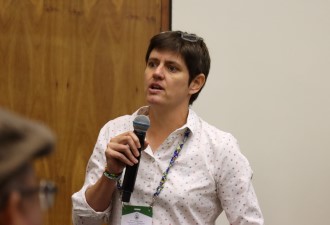
Dr Nicky Taylor, University of Pretoria
“Determining if a crop is the best use of irrigation water in a certain area, asks of us to consider everything from water-use metrics, management practices, other crops in the region and all factors that influence the sustainability of the region's water source,” said Dr Nicky Taylor of the University of Pretoria. She presented the results of a study that asked whether pecan orchards are the best use of irrigation water in semi-arid regions of the Northern Cape province of South Africa.
In the Northern Cape province of South Africa pecan production has steadily increased over the last 20 years and there is concern that pecans orchards use more water than the traditional annual crops produced in this region, which includes maize, wheat, barley, and cotton.
She reminded that all values used when answering a question like this are very season and region specific. Estimations of crop water productivity (WPc, ratio between yield and evapotranspiration (ETc)) and economic water productivity (EWPc, ratio between gross margin and ETc) for two pecan orchards in two different regions of the Northern Cape province indicate that these values vary quite considerably for each season and each region. This is largely due to variations in yield from year to year and differences in ETc between regions, due to prevailing weather conditions, irrigation system and size of the trees.
When compared to other annual and perennial crops in the region, WPc did not compare favourably, due largely to the lower yield of oil storing pecan nuts. However, when comparing EWPc pecans tended to have a higher Rand value for the water consumed during production. This suggests that pecan production in this semi-arid region of South Africa is justified, but efforts still need to be made to use water more efficiently in these orchards. Quantification of the partitioning of water use between beneficial and non-beneficial water use, suggests that savings could be made by reducing the soil evaporation component of ETc.
Taylor concluded that the expansion of the crop in the area can be partly explained by the profitability of mature pecan orchards per m3 of water applied. She also highlighted that pecan orchards require very little irrigation during the winter months, while winter rotation crops are reliant on irrigation.
Croatian Terroir
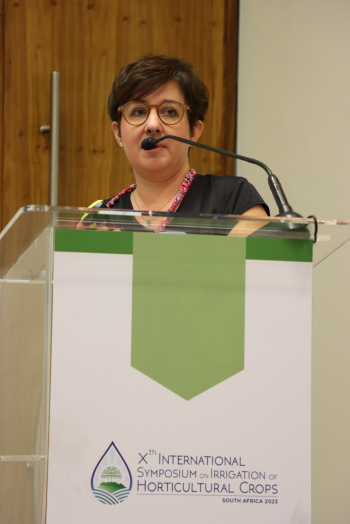
Prof. Monika Zovko, University of Zagreb
“The concept of terroir is changing, it is adapting to changes in viticulture and winemaking on a global level,” said Prof. Monika Zovko of the University of Zagreb to conclude her presentation on irrigation as a measure to sustainable viticulture in Karst Mediterranean landscapes in Croatia.
Water stress and increasing air temperatures are reported to be among the most influential impacts of climate change on viticulture, affecting the length of the growing season, changes in phenology, and ultimately product quality. In limited water environments, such as the south of Croatia and Mediterranean Europe in general, opportunities for improving water use efficiency are keenly sought. Precision irrigation is expected to increase both resource use and economic efficiencies, because it aims at matching water input to actual crop water requirements in each sub-area of the field, so reducing the costs of resources and increasing yield. Implementation of precision irrigation requires knowledge of soil, air and plant factors in space and time.
Effective precision irrigation requires a holistic approach which considers all the factors (soil, plant, and atmosphere), expected to affect the dynamic response of plant to variable inputs. A substantial aid to precision irrigation can come from the use of a set of innovative technologies (real-time ground/air-based and on-the-go sensors, wired and wireless networks and software frameworks) to collect and send data towards a processing core consisting of knowledge-based system. Zovko’s study was aimed at systemising knowledge on the effect of irrigation on grapevine grown in the different Mediterrenean terroirs in the Adriatic coastal area and the use of precision agriculture tools to determine the effects of different irrigation approaches on vine vegetation growth. “We believe the advancement made in these research fields will foster the application of precision irrigation in Karst, which is a key contributor to sustainability of agricultural production in water stressed Mediterranean landscape.”
Deficits and Potential
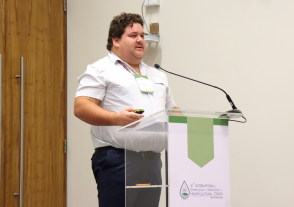
John-Murray Visser, University of Stellenbosch
John-Murray Visser of the University of Stellenbosch shared results from his study investigating the effect of deficit irrigation that is based on plant water potential on physiological and reproductive responses of grapevine in three different climatic regions in the Western Cape.
One of his most important conclusions was that Stem Water Potential is an indicator of plant water stress and can be used to calibrate soil water sensors to determine irrigation refill lines.
The study explored the effect of three midday stem water potential thresholds on the selected grapevines. Threshold treatments were applied, between pea berry stage and harvesting during three growing seasons. The following midday thresholds were applied: -1.1 MPa (T1); -1.5 MPa (T2) and -1.8 MPa (T3). Over the three seasons and in all regions, T3 produced bunches with lowest mass, compared to that of T1. Improvements in overall grape quality also occurred due to significant reductions in water applications in all three regions. In one region a saving in irrigation water of 47% for T2 and 66% for T3 compared to T1 while these savings were 64% and 81% in another region. A similar trend occurred in the third region with a reduction 39% for T2 and 89% for T3 compared to T1. The study concluded that there is a significant correlation of midday stem water potential with yield and grape quality. “I believe this research can greatly help the wine industry in developing practices for water saving and improved wine quality through the use of midday stem water potential as an aid in irrigation scheduling. Based on the results of this study it is our belief that water saving is possible when irrigating at a higher stress level, without reducing yields significantly,” he said.
Too Much Water
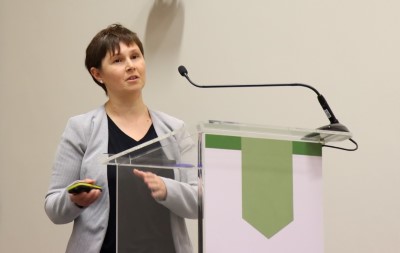
Prof. Brunela Morandi of the University of Bologna
“We are still over irrigating,” was the powerful end to Prof. Brunela Morandi of the University of Bologna’s presentation.
Her study investigated the plant physiological responses and fruit vascular flows under deficit irrigation in apples. She reminded that it is increasingly important to understand plant and fruit physiological responses to reduced irrigation, while developing precise irrigation approaches to meet the real orchard needs.
A trial was performed in the Po Valley in Italy where apple trees were subjected to two different treatments corresponding to irrigation supplies of 100% and 50% of the estimated ETc, respectively. Fruit and shoot growth as well as the daily patterns of leaf and stem water potential and leaf gas exchanges were monitored at different times during the season. In addition, during cell expansion, the daily pattern of fruit vascular flows was estimated using fruit gauges.
Results showed no differences in fruit and shoot growth rates during the season. Midday stem water potential was reduced by deficit irrigation on two dates, while photosynthesis was never affected. The daily patterns of fruit vascular flows confirmed the typical apple behaviour characterised by increasing phloem and decreasing xylem and transpiration flows during the season. Deficit irrigation induced some occasional reductions in xylem and phloem flows at some hours of the day, but results were quite variable, with no differences between treatments for daily growth and cumulated daily phloem and xylem flows.
Morandi emphasised that, based on these results, we can confirm stem water potential as one of the most sensitive parameters to assess plant water status. “However, even with reduced stem water potential values, no clear-cut consequences were detected on leaf photosynthesis nor on fruit growth and vascular flows, except on some occasions. We can conclude that apple trees can develop physiological responses to adapt to mild stress, while an irrigation driven by ETc can often lead to an overestimation of the orchard water requirements.”
The Potential of Shared Knowledge
“Today’s presentations once again illustrated the massive benefit of an international platform for sharing knowledge such as the ISHS. These platforms cannot be underestimated. Remember, one plus one is always more than two. Interaction beyond borders, between institutions, companies, famers and beyond has massive value with a lasting effect,” commented Charl van Reenen, Agronomy Manager at Netafim South Africa after day 1 of #ISHSirrigation2023.
For Netafim, he says, its is a priority to be a link in the journey of knowledge from the academic field to the agricultural field. "We focus on not only sharing our expertise, but we also place massive value in research cooperation and field trials. This is why it is so important for us to support a growth opportunity for the local and global industry as this symposium offers."
Keep an eye on www.netafim.co.za and Landbouweekblad’s platforms for more about the knowledge shared. Be sure to follow #ISHSIrrigation2023 on social platforms.

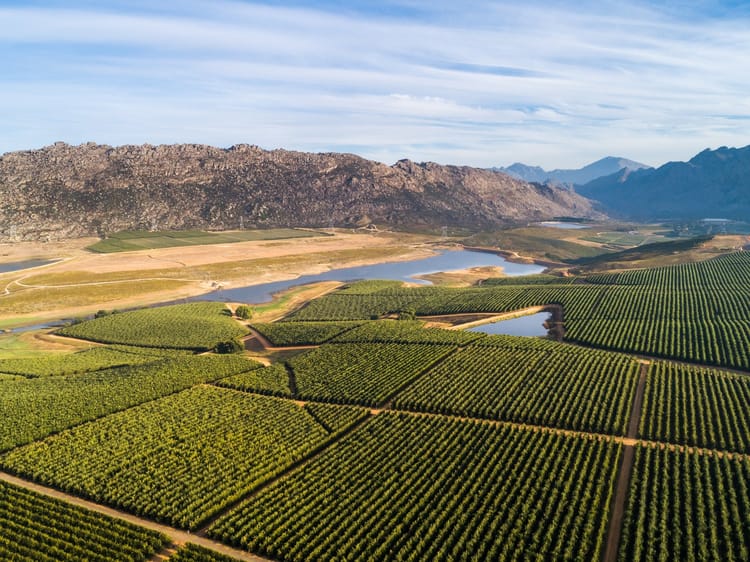
Share your thoughts
Comments
We'd love to hear your thoughts! To enter a comment, type your name and email address.